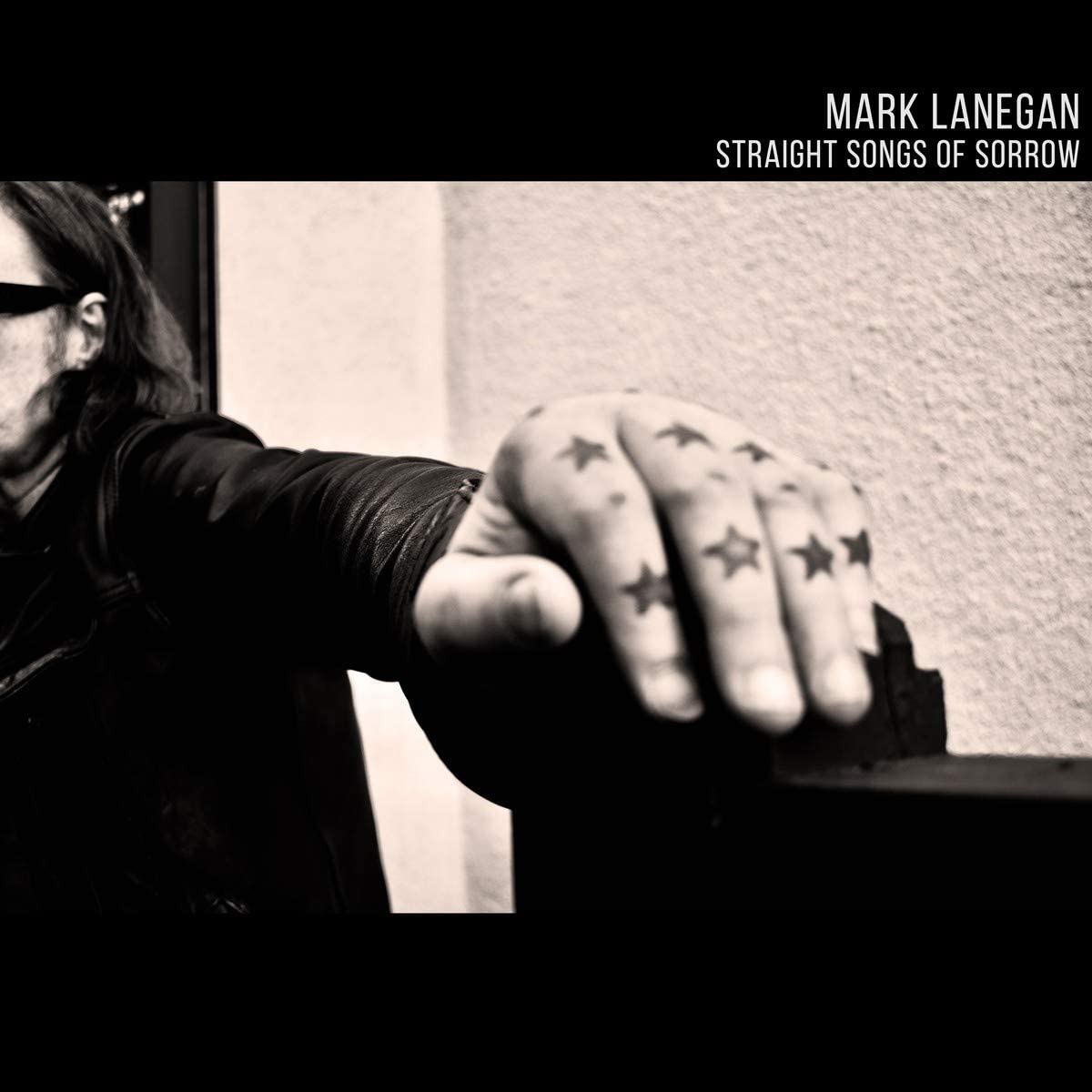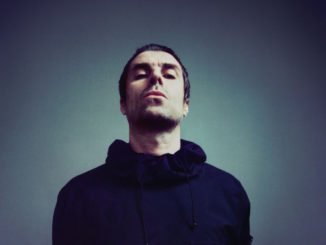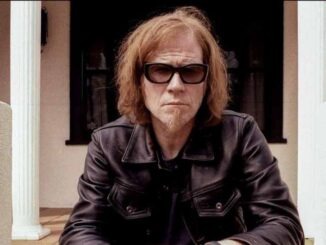
In his second album release in less than six months, Mark Lanegan’s Straight Songs of Sorrow chronicles the harrowing journey of the darkest and most defining periods of his life, from growing up in Washington State to his early life on the road as a musician. The real catalyst for the music was completing Lanegan’s first-ever memoir – Sing Backwards and Weep. In the book, Lanegan describes himself as “the ghost that wouldn’t die”, and this album has a haunting air of twisted invincibility and defiance.
With shredding guitars used sparingly in this record, it is more subtle and delicate than his previous release, Somebody’s Knocking. This album lays out Lanegan’s drug addiction and the mayhem that transpired to help fuel his hollow & destructive obsession in very stark terms.
The hypnotic, electronic opener, ‘I Wouldn’t Want To Say’ is laced with many of the sad aspects that were typical of Lanegan’s life – “My heart is black as night…”- depression / “All those who tried to help me scattered like mice” – loneliness and alienation / “How many more years will it be before the end of this sad machine” – torture. His lyric, “Swinging from death to revival”, encapsulates the knife-edge that Lanegan constantly found himself on, ultimately finding a way through the shadows. Lanegan writes in the book – “My life flashed before my eyes: my wasted childhood, my arrogant youth, my anger and obsessions, crime, delusions, self-loathing, paranoia, hopelessness, fury & sad junkie downward spiral.” More than any other on the album, this first song fully captures this toxic adventure.
However, his music is not bereft of hope, expressing the shining light of present love and the pain when it has been all too absent – “You are the part of me I lacked, the mother I never knew, the love I never had”, Lanegan sings on the tender ‘Apples from a Tree’, which also features Lamb of God’s Mark Morton on acoustic guitar.
Similarly, the beautiful ‘This Game of Love’, sung with Lanegan’s wife Shelley Brien, is aspiring yet with a texture of self-doubt and trepidation – “Free my soul of emptiness. I know the taste of sorrow. Tonight I am delirious, live to play tomorrow / There will be hell to pay, am I going to lose this game of love?”
A number of the tracks smack of the desperation and consuming nature of finding that next heroin-induced hit. Large parts of Lanegan’s autobiography recall him scouring the shadier streets and alley-ways of Europe late at night, often after gigs to score; a recurring, living nightmare from city to city. As Lanegan poignantly sings on ‘Ketamine’, “To plant my flag on distant shores and take me through the night / I’d walk the whole of the earth with a thousand-mile stare / To hide my true dark nature and keep it out of sight”. The violin score in ‘Stockholm City Blues’ is particularly chilling, where Lanegan is truly unreachable in his torment – “No one could ever tell me that enough’s enough”, and he is all too willing to “trade a few more nickels for another nail / descending every ladder until the final rung.”
No Lanegan record would be complete without carefully hand-picked collaborations underlining his tremendous respect for his peers. In this instance, we hear from Lanegan’s long-term co-performer Greg Dulli (Afghan Whigs & The Gutter Twins), accompanied by Warren Ellis (The Bad Seeds) on the folky ‘At Zero Below’; Ed Harcourt & Peter Hook’s son Jack Bates on the hazy ‘Churchbells, Ghosts’; John Paul Jones (Led Zeppelin) and his swirling, manic mellotron on ‘Ballad of a Dying Rover’; Adrian Utley (Portishead) on the evocative ‘Daylight in the Nocturnal House and Simon Bonney (Crime & The City Solution) on the album’s finale, ‘Eden Lost and Found’.
An abundance of failed relationships is another common thread running through the album. In ‘Bleed All Over’, Lanegan somewhat ironically threatens, “Baby, baby, baby don’t you say it’s over yet, now that I ain’t got a dime / don’t you give a damn.” His ghostly and once lonely existence is expressed through the lyric, “I’m haunted by these monochrome nightmares”. At over seven minutes, ‘Skeleton Key’ is a masterclass in desperation, self-loathing and empty resignation. “Love me, why would you ever love me? / I spend my life, trying every way to die, as if it’s my fate to be the last one standing / Follow me down, through the underground. I will sing to you a sweet, straight song of sorrow.”
The short but sublime, ‘Hanging On (for DRC)’ is one of many highlights on Straight Songs of Sorrow – a song was written in appreciation of his good friend and fellow swindler of the Grim Reaper’s swinging scythe, Dylan Carlson. On Lanegan’s dedication to his blood brother, they seem to have dodged an infinite amount of bullets over the years, thanks in part to the intervention of fate – “Only you and the devil know where I’ve been / the times and ways we could have died, we had other lands to find”.
The closing track, ‘Eden Lost and Found’, written with his wife Shelley Brien and sung with, in Lanegan’s own words, ‘his favourite singer’, Simon Bonney of Crime & The City Solution, is a fitting and tranquil end to the album. It contains one of the best lyrics on the release – “Ain’t got much of nothin’, except greys by degrees”, and the track vividly paints Lanegan’s transition from hell to his eventual arrival at salvation, getting clean and free of his demons – “Found the doorway to Eden, lost myself in a concrete city / Daylight is calling me / Sunrise coming up baby / To burn the dirt right off of me”.
Lanegan describes writing his book as opening up a ‘Pandora’s box of pain and misery’, yet the very gift of that excruciating experience was the doorway and the enabler to write these songs. Without the trauma of writing the memoir, this album in its final form would simply have not happened. Reading the book alongside listening to this latest collection really adds another dimension to Straight Songs of Sorrow. We can never fully understand Lanegan’s pain during these years. However, his journalling lifts the lid and gives us the beginnings of an understanding, a deeper appreciation of the struggles and rebirth that continue to shape his prolific musical craft. Straight Songs of Sorrow is a brutally honest record, full of pleasure, pain, darkness, light and ultimately, hope.




Be the first to comment